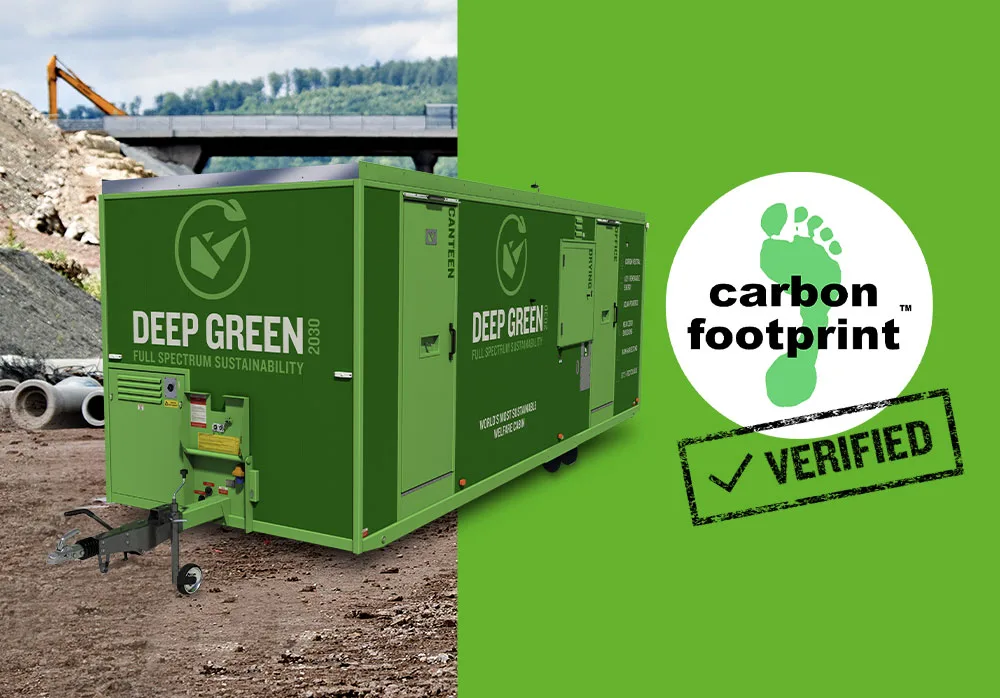In a market saturated with products claiming to be eco-friendly, it can be very hard to sort the wheat from the chaff. With confusing and conflicting information at every turn, it would be reassuring to know that the product you are buying or hiring does what it says on the tin.
Therefore, we’re delighted to announce that the carbon and fuel savings achieved by Boss Cabins’ solar-powered Deep Green 2030 welfare cabins have been scrutinised and verified by highly respected independent industry assessors Carbon Footprint Ltd.
After thorough analysis, they concluded that using a Deep Green canteen office welfare unit in place of a standard one, would save a total of 3,400 litres of fuel each year on operation and servicing and reduce CO2 emissions by 8.4 tonnes.
At current market prices, the financial savings on the fuel used and service visits avoided by replacing a standard ‘eco’ 24ft Canteen Office with the Deep Green alternative, would equate to an annual operational cost reduction of £10,641.
Internationally recognised organisation Carbon Footprint carried out an in-use Energy Saving Assessment, looking at data contrasting the performance of our flagship 24ft Deep Green Canteen Office to that of a standard Canteen Office of the same size with some ’eco’ features such as LED lighting. The solar performance, energy consumption and generator runtime of the cabins while in normal on-site operation mode were all calculated and compared.
Carbon Footprint’s analysts concluded that utilising a highly energy-efficient solar-powered Deep Green Canteen Office on site rather than the standard ‘eco’ one will save on average in operation circa 3,260 litres of fuel per annum which equates to 8.1t CO2/year. Deep Green cabins annual operations have 9.3% of the in-use emissions of a standard ‘eco’ cabin, a 90.7% overall reduction.
Carbon Footprint also looked at the impact of reduced service visits on Deep Green’s fuel and carbon savings. Important Deep Green innovations – such as the patented rain harvesting and grey water recycling system Waste Management Pro™ and the patented Infinity™ generator with a 2,000-hour service interval – create a significant reduction in the need for service vehicles to visit the cabins, eliminating yet more CO2 emissions.
Assessors considered the reduction in toilet service visits and water deliveries produced by the Waste Management Pro™ system and assessed that the water saving and reduced waste production benefit from the embedded technology reduces the requirement for toilet servicing by circa 2/3. This reduces the fuel consumption and associated CO2 emissions by the same percentage.
Assessors also considered the reduction in generator service visits effected by the patented Infinity™ generator fitted in all Deep Green welfare cabins. The Infinity incorporates a patented automatic oil change function that increases the service interval to once every 2000 hours. Compared to a standard generator that needs servicing approx. 6 times a year (every 200-250 hours of runtime), this is a reduction in generator service requirements of circa 99.4%. With generator runtimes in the Deep green so low, users would expect to service the generator roughly every 19 years.
By cutting the number of service vehicles visiting site, it was calculated that the reduced service attendance requirements for the Deep Green product will save approx. 140 litres of fuel per annum, saving a further 352kg of CO2 emissions per cabin.




